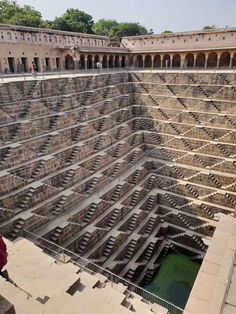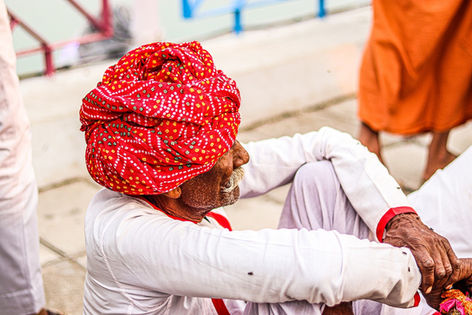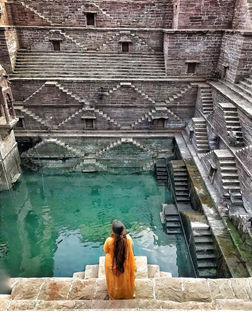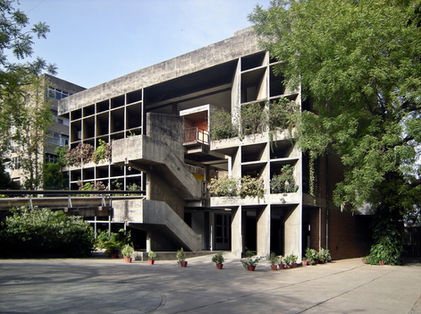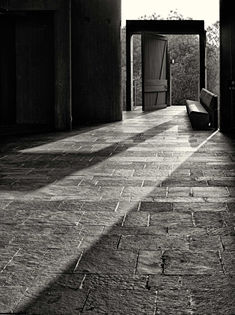

MOVING BOUNDARIES INDIA - Winter 2025 – COURSE AND CONFERENCE
December 2-11, 2025
The 6th Edition of the Moving Boundaries Course in Neuroscience, Environmental Psychology, Landscape Architecture and Architecture will be held in the dynamic city of Ahmedabad, India, with lectures and masterclasses, discussions, workshops, music and art events, communal meals, morning walks and exercise, networking activities, architecture tours, and a field trip outside the city to visit traditional water systems and temples.
Spatial Ecology
People’s relation to nature has been transformative to human civilisations. From haptic experiences, multivalent spiritual and social associations, the discourse has traversed into statistical and numerical efficiencies. Conflicts and contestations seem to have reached a crisis point, with issues related to climate change, impacts of the built environment on health and human behavior, resource management, and technological developments. Over time, people have been alienated from a fundamental, primordial and essential connection with nature. Many kinds of knowledge, systems, networks, infrastructures, have been made invisible.
The concept of Spatial Ecology prompts a shift towards design of human habitats that reveal and bring into view the interconnectedness of relationships that construct our world. Working at the interface and dissolving boundaries between multiple human sciences, including neuro and cognitive science, environmental psychology, anthropology, sociology and landscape design/architecture disciplines, this course intends to unpack the world of connections, the visible and the invisible, to decipher our intimate connection to the world. As our bodies experience the air, water, land and other life around us, we intend to discover the means by which spaces help us to connect to the rich, diverse knowledge structures around us. The process situates architecture as intrinsic to the negotiation between natural and human. Shifting paradigms, the intention is to disrupt this deeply rooted dichotomy and see architecture as part of a relational network that emphasizes processes and flows over objects.
At MB India, the winter program will include lectures, masterclasses, discussions, workshops, field trips, landscape and architecture tours and multiple social events and networking opportunities. We will learn how scientific concepts and methods can help develop new tools and strategies in architecture, landscape design, city planning and design education. We will also explore the importance of history, regional culture and identity in the making and experiencing of architecture and landscapes. Every participant will receive a Certificate of Completion at the end of the course. Please read our Mission Statement for more information.
Grounded in the culture of western India, participants will experience the rich cultural context of the Gujarat region, including the dynamic city of Ahmedabad, which holds many treasured works of architecture and landscape design including those by Balkrishna Doshi, Charles Correa, Louis Kahn, Le Corbusier and many others. Participants will be offered unique tours of work by these architects and will also enjoy day trips outside the city, to discover water systems, stepped wells and temple sites. In addition to local architecture, we will experience local crafts, music, dance, art, cuisine, and other rituals and traditions which make this region of India so important. At the heart of these activities, all part of the culturally immersive Moving Boundaries program, the notion of Spatial Ecology, as central topic, prompts a shift towards design of human habitats that reveal and bring into view the interconnectedness of relationships that construct our world.
Contact Us: movingboundaries2025@gmail.com
“The elements of architecture are not visual units or gestalt; they are encounters, confrontations that interact with memory.”
- Juhani Pallasmaa, The Eyes of the Skin

PROGRAM AND ROSTER OF SPEAKERS ARE SUBJECT TO CHANGE




Teaching Venue
CEPT University
Ahmedabad, India
The Moving Boundaries Collaborative is proud to be hosted by CEPT for this Winter 2025 Course and Conference.
CEPT University focuses on understanding, designing, planning, constructing and managing human habitats. Established in 1962 at the School of Architecture, it has grown to comprise 5 Faculties namely, Faculty of Planning, Faculty of Technology, Faculty of Design, Faculty of Management and the CEPT Foundation program. A strong focus on teaching, the University has acclaimed alumni across the globe. In 2024, CEPT ranked 6th in the country in the category of Architecture and Planning. CEPT is the only private university to make it to the top 10 Universities in this list. Its teaching programs aim to build thoughtful professionals and its research programs deepen understanding of human settlements. The University has been recognized by the Govt. of India as one of four Centre of Excellence (CoE) in Urban Planning and Design. CEPT University also undertakes advisory projects to further the goal of making habitats more liveable. Through its education, research and advisory activities, CEPT strives to improve the impact of habitat professions in enriching the lives of people in India's villages, towns and cities.












